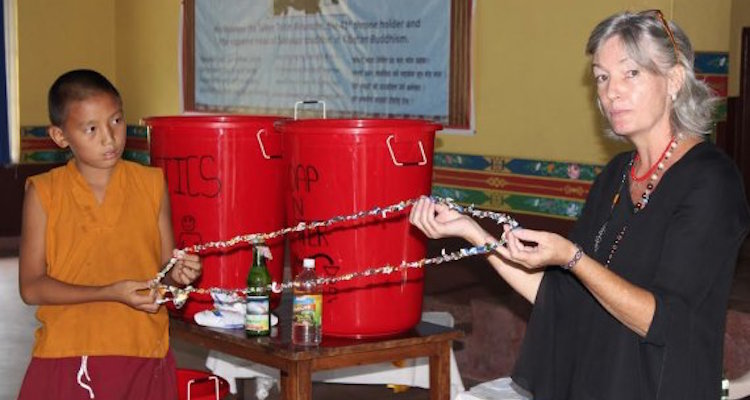Listen Now
Tina Cornely is the founder of the non-profit organization Bridging Humanity – an organization dedicated to breaking the cycle of poverty through holistic solutions. In particular, Tina focuses her work on her recently published 9 Steps To Eradicate Poverty, which provides practical solutions for agriculture, self medical care, energy production, water purification, repurposing of trash, family planning, hygiene and environmental protection. Prior to founding Bridging Humanity, Tina was the Director of Technology of the Solomon R. Guggenheim Museum and former Operations Director of the Miami Art Museum. You can connect with Tina here: https://twitter.com/tinacornely https://en.wikipedia.org/wiki/Tina_Cornely
IN TOR 063 YOU’LL LEARN ABOUT:
- Tina’s career as a crafter, a technologist and an artist.
- How Tina (and you) can make practical impact from a very frugal approach.
- The value Tina places on an education model that empowers women and communities.
- The role water quality and women’s health play in poverty, and how in Tina’s view addressing those issues are clear steps to ending poverty.
- The value of self-directed research, being a ‘tinkerer,’ and making sure people understand tools as they ‘go with it.’
OUR CONVERSATION INCLUDES THE FOLLOWING:
Organizations
- Bridging Humanity http://bridging-humanity.org
- 9 Steps to Eradicate Poverty (book) http://9stepsthebook.onbile.com http://bridging-humanity.org/wp-content/uploads/2014/08/9-Steps-the-Book-Saving-Lives-with-Holistic-Remedies-Updated.pdf
- USAID
- Android
- Golden Institute
Topics
- Poverty eradication
- Art
- Technology
- Education
- Water quality
- Volunteering
- Preeclampsia
- Women’s health
- Ebola outbreak
- Social entrepreneurship
Places
- Miami, FL
- San Carlos, Nicaragua
- Mali
- Borneo
EPISODE CRIB NOTES
Bridging Humanity Volunteer-based effort to eradicate poverty. Nobody gets paid so all money goes straight to the people. Tina started in technology, teaching programming and networking. It meshed with art, she got involved in technology possibilities for art. A tinkerer in nature. Spends her vacations doing development work around the world (like Mali). Friends encouraged her to launch the NGO. Took the name, set the website. Education is the first step. “There are things that look difficult but are not.” Showing Internet to kids in Africa opens their mind. Making technology easier to use, re-purpose “trash.” Shares her knowledge. 9 steps across many years Extensive research on the roots of poverty. Number one: poor water quality. It evolved from there. What is poverty? What are the roadblocks for poor people? Golden Institute, a friend pushed her. She’s been moving the book around, it’s a booklet. It is made for poor people to read and take guidance. She carries the book with videos and tools to show it to people in many languages. Plans to complete her traveling and invest more in the website. Still small, starting to gain momentum, talking to partners. Creating an organization “I do not foresee to grow. I like to stay on the field, rather focus on finding key partners to do the clerical.“ Volunteers are always welcome. A story Tina finds out about an easy way to treat preeclampsia in women, a deadly affection. Designs a guide for midwives to detect it early. Simple solution and low tech, designed for populations without proper access to health care infrastructure, but everyone can use it. Next step is using smartphones for more advanced health testing. Midwives have provided feedback for guides to improve. Plans to participate in contests. The time to ask “Am I enough?” Tina feels content with results, and outcomes. She focuses on a small group of people and making sure they understand how to use simple tools and systems. Use the local network to communicate knowledge. Systems must be adapted, cultural and religious rules change tribe to tribe. Multitasking to success 50% in projects, 50% in administrative. “The smartphone is a godsend.” Has created 2 apps for women’s health. Community projects made her known in international development, on her flight to Mali she realized that is what she wanted to do. Does Tina ever fail? A lot of struggle, alone at home, wondering how to bring light to villages. How hard is it to make a simple battery? Fruits have some minerals needed for batteries. Took a lot of months, testing. Finally finds a way to make a battery out of charcoal. It lighted LEDs. It worked but she realized there were a lot more efficient alternatives out there. Tina on the future of development A lot of challenges. Ebola shows how entrepreneurs moved fast to provide solutions. USAID is learning to tap into them for quick and impactful action. By promoting social entrepreneurship, “in a way we are creating global citizens that figure out solutions and cultivate problem solvers all over the world.“ The tipping point of poverty relief In Borneo, teaching to re-purpose trash for use and sale. Crochet needle for plastic bags. It’s about giving them tools and letting them go with it. On the last day she holds a contest party, donors end up as guests. Women blew her expectations, making clothing and shoe wear. Advice Be passionate. What is it that makes you passionate? If more people follow their dreams the world would be a better place. If we want a future we need to take better care of our resources.Please share, participate and leave feedback below!
If you have any feedback you’d like to share for me or Tina, please leave your thoughts in the comment section below! I read all of them and will definitely take part in the conversation. If you have any questions you’d like to ask me directly, head on over to the Ask Stephen section. Don’t be shy! Every question is important and I answer every single one. And, if you truly enjoyed this episode and want to make sure others know about it, please share it now:[feather_share show=”facebook, twitter, linkedin, google_plus” hide=”reddit, pinterest, tumblr, mail”]
Also, ratings and reviews on iTunes are very helpful. Please take a moment to leave an honest review for The TOR Podcast! 



